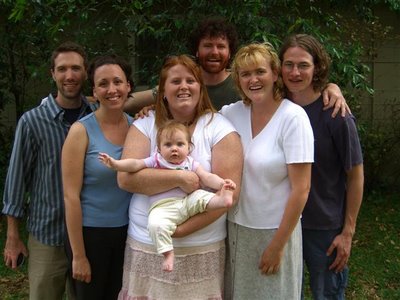Still hunting for a church home here.
We didn't want to be without one for this long. And it hasn't been for lack of visiting. The original plan was to try and find something nearby - which, in this city, means within half an hour's drive - but this isn't exactly a big churchgoing neighborhood. Now, usually that seems to be where you find the best kind. But the one we'd had some hopes for is over-50 only, and they're lapsing back into the thees and thous.
Actually, lapsing isn't the best word for it. Actively steering seems to be more the case. This is the neo-Anglican startup, and i think they're reacting against all things Modern Episcopal instead of just the sagging doctrine. (Notice how well i resisted using the word "eschew" there? It's not often you have the chance, you know. Just wanted to point that out.) Reminds me a little of the "prophecies" spoken out in some churches i've been in. As often as not, they're in the King James English. Funny that God is so behind the times. When Jesus walked the earth it was a wonder he didn't speak in ancient Sumerian or something instead of his everyday Aramaic. Since, as we all know, if he were here today and speaking English, he'd sound like a diplomat, perfect as the Queen -
never like some provincial blue-collar minority-born homeless guy.
Oh, wait.
So yes, that was a little sad, to me. Especially since the
Anglican church worldwide contains a couple of the few churches i've really ever felt at home at. (Not that feeling at home is always good, but that's another topic.) These congregations, these collections of people, didn't feel the need to deal in the cliches. They somehow managed to communicate their passionate faith using the same words as regular people, rather than the melange of NKJV Old Testament phrases and Christian newspeak that pervades so many other evangelical churches today.
The exception to that would be the liturgy, but hold on to that one for a minute. The irony is that the average "evangelical" church was born fleeing the rote indecipherability of the liturgy, which, at its best (though it's generally not) is a rich tapestry of the entire life history of Christian worship. It's been a touchstone of orthodoxy against two thousand years of the latest religious fads. The accumulated wisdom of Christians over the ages - and in such beautiful language, if you care to listen. I'm not saying everyone should like it or use it. It absolutely can get repetitive and lifeless if not cared for and updated. There's nothing magical about it, either. But what bothers me about the most liturgical churces is the same thing that bothers me about most "evangelical" churches that can't stand the thought of an old liturgy. The new evangelicospeak has now become its own language, as bizarre and impenetrable to the average person as any droning Latin mass ever was.
And by "average person," i mean just that:
non-Christian.
Cuz Christian speech, Christian conversation, really is becoming a newspeak. It's an insular language-culture with a life of its own, growing quickly but inward, beyond its now-forgotten roots. Unless you use these same old catchphrases people are familiar with, some places i've been, they're very concerned you're talking about something dangerous.
Why is it so hard for us to just deal freely and fully in the cultural vernacular, spiced with the best of rich tradition? Why doesn't something sound spiritual if it's not stated in canned and precisely defined terms? If Jesus showed up today, i don't think i'd recognize him. I'd be too busy looking down my nose, keeping an eye out for the cyanide Kool-Aid. And i don't think i'd be alone. What this really is all about, it seems to me, is holding one's doctrine too tight.
I'm in trouble from my sister at the moment for procrastinating on a promised theological argument. She has a master's in systematic theology, and i have a weakness for playing devil's advocate, so we enjoy making each other mad now and then. But i'm realizing i look very differently at the world than i did as a college senior. And the difference has come from working. Not in any particular job, or even in any job, but
working, in the
doing sense. I used to think there was no excuse for anyone who didn't care about learning, or knowledge, or theology, or whatever you want to call it. (A dangerous string of nouns to lump together, but let's leave it.) But now, i realize that i really don't either.
Let me clarify: I thirst for knowledge. I'm a sponge for news and information and culture and all manner of useless facts. I care deeply about truth in all its tiny particulars; i think we need to be thinking about them and striving for excellence in the intellectual area as well as in science or any other. (As if they could all be separated. ha ha...oh, sorry, inside Wheaton joke.) It's just that the tiny particulars can seem less important once you've seen what else you could be doing with your time. Particularly when some of them will always be above our collective human head anyway.
I think it's
Mercy Ships' fault. Putting together a hundred different denominations from forty different countries and any number at all of different cultures, making them live in close community and get along and work towards a common goal...terrible. Awful, really. Instead of spending all their time and energy arguing over heated opinions and getting angry and refusing to associate with one another, they actually cared more about feeding the hungry and curing the sick and helping the poor. What a travesty.
But aren't they both important? (I'll just ask the questions for you.) Aren't you saying this just cuz you happen to be into aid work? Can't you care about both? Obviously. On the ship, we used to sprawl around in the crew lounge and argue in good fun all the time. You need to do both. But it doesn't seem to me anymore that the one's proper place is as prominent in life as the other's. When you've seen how
big this world is, and how very much there is that so desperately needs to be done....
I don't know. But please, God, may it not be true that evangelical Christian culture, intellectual or anti-, is as hidebound, unwritten-rule-bound, and arrogant as its lingustic counterpart.
"Orthodoxy, or right opinion, is, at best, a very slender part of religion. Though right tempers cannot subsist without right opinions, yet right opinions may subsist without right tempers. There may be a right opinion of God without either love or one right temper toward him. Satan is a proof of this."
--John Wesley
"Those things belong to the deep and mysterious profound of God's omniscience. Prying into them may make theologians, but it will never make saints."
--A.W. Tozer
"You keep meticulous account books, tithing on every nickel and dime you get, but on the meat of God's Law, things like fairness and compassion and commitment - the absolute basics! - you carelessly take it or leave it. Careful bookkeeping is commendable, but the basics are required. Do you have any idea how silly you look, writing a life story that's wrong from start to finish, nitpicking over commas and semicolons?"
What, that doesn't sound like him?
All right, then. Click
here.

 This used to be a whole neighborhood.
This used to be a whole neighborhood. This used to be Marine Life. (Recognize?)
This used to be Marine Life. (Recognize?) And this used to be crew. ha ha.
And this used to be crew. ha ha.